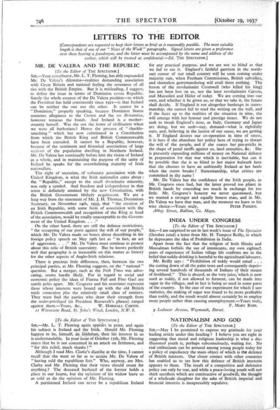[To the , Editor of THE SPECTATOR.]
:
Sm,—Mr. L.- T. 'Fleming again appeirs in print, and again his subject is Ireland and the Irish: Should Mr. Fleming happen to be, himself, an Irishiaan;; Olen his interest in us is understandable. In your issue of October Isth, Mr. Fleming states that he is not concerned in an attack on Irishmen, and " for this relief, much thanks !
Although I read Mrs. Clarke's diatribe at the time, I cannot recall that she went so far' as to.acense Mr. De Valera of " having sold the republican fort." Who, anyway, are -Mrs. Clarke and Mr. Fleming that their views should count for anything ? The deceased husband of the former holds a place in our hearts, but the opinions of his widow leaie us as cold as do the opinions of Mr. Fleming.
A partitioned Ireland can never be a republican Ireland for any practical purpose, and we are not so blind as that we fail to see it. England's faithful garrison in the north-- east corner of our sniall country will be soon coming under majority rule, when Feetham Commissions, British subsidies, and shameless gerrymandering will avail them nothing. The lesson of the revolutionist Cromwell (who killed his king) has not been lost on us, nor the later revolutionist Carson, and Mussolini and Hitler of today. We are coming into our own, and whether it be given us, or that we take it, the future shall decide. If England is 'not altogether bankrupt in states- manship, she cannot fail to read the writing on the wall, and if she faces up to the realities of the situation in time, she will emerge with her honour and prestige intact. We do not seek to tweak England's nose, as Italy, Germany and Japan are doing, but we seek—nay, demand—what is rightfully ours, and, believing in the justice of our cause, we are getting - it. If England desires our co-operation in time of stress, it is hers if she abandons her policy here of trying to thwart the will of the people, and if she ceases her pin-pricks in the shape of penal tariffs against us, land annuities, &c. She is presently expending millions of money on National defence in preparation for that war which is inevitable, but can it be possible that she is so blind to her major bulwark here that she chooses to have an unfriendly Ireland at her heels when the storm breaks ? Statesmanship, what crimes are committed in thy name !
Mr. De Valera has the confidence of the Irish people, as Mr. Cosgrave once had, but the latter proved too pliant in British hands by conceding too much in exchange for too little. Mr. Cosgrave's honesty we never questioned, but we wanted a stronger and equally honest man, and in Mr.. De Valera we have that man, and the moment we leave to his wise choice.—Yours truly, PETER PADDEN. Abbey Street, Ballina, Co. Mayo.


























































 Previous page
Previous page